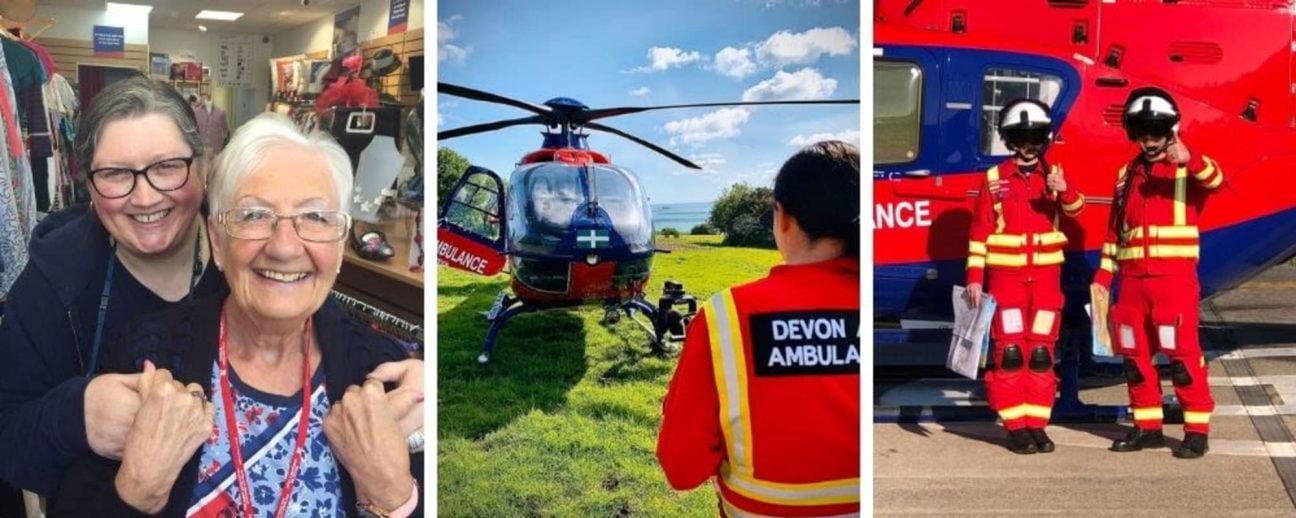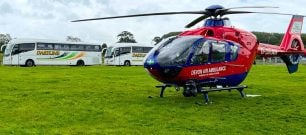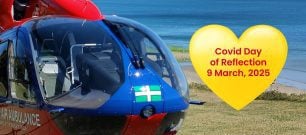
Being an ethical employer requires continued efforts to respond to the challenges of our times and because it is the right thing to do.
Many people seeking better ways of working have shifted their priorities following the start of the global pandemic in 2020. Against the context of climate collapse and social movements that challenge structural inequality and discrimination, more of us than ever are seeking to lend our talent and skills to organisations that are ethically-driven.
An article published in the magazine Ethical Consumer recently outlined what jobseekers should look for in a prospective employer. Here we respond to their recommendations for questions that ethically minded jobseekers should ask.
Employment policies
A healthy and happy workforce is essential to the smooth-running of a charity. A solid team working towards aligned goals is what helps a charity like Devon Air Ambulance to advance its mission.
From flexible working to good mental wellbeing, having supportive policies in place is paramount, both for the continued health of a team and the organisation.
Is Devon Air Ambulance a Living Wage employer?
In 2021 Devon Air Ambulance acknowledged its sixth year as a Real Living Wage Employer.
Devon Air Ambulance believes in a fair wage for a fair day’s work. There are lots of benefits to being a Real Living Wage employer. It shows staff that their employer cares about them and their quality of life, helps increase staff motivation and improves retention rates. Recruitment can be an expensive process, so it’s in the interest of the charity and those who work hard to support us that we ensure our staff want to stay with us.
Read more about why we are a Real Living Wage Employer.
What is the pay gap between employees?
Devon Air Ambulance signed up to Show the Salary – an initiative to encourage the charity sector to be transparent about salary when advertising roles and close the pay gaps and inequities that exist.
Our Pay Policy states a limit on the Pay Gap (between highest and median pay), which is within the industry standard of 1:5. The highest salary pro rata is determined by the British Medical Association. Similarly the lowest salary is established by the Real Living Wage.”
Are policies around working hours fair?
The overwhelming majority of Devon Air Ambulance staff – office, operational and retail, are contracted to guaranteed working hours. There are a couple of unique exceptions however: PHEM (Pre-Hospital Emergency Medicine) Fellows and a couple of doctors who joined us during particularly busy periods have undertaken infrequent hours alongside their usual work.
Our flexible working policy accounts for the needs of caregivers and accepts that in many roles the workload need not necessarily be executed during 9-5 hours. Because colleagues are trusted professionals who are intrinsically motivated, they can manage their own workloads without the need foster a culture of presenteeism.
Working hours during Covid
During the first lockdown over the course of the Covid 19 pandemic, many of our retail team and several office staff were furloughed. The charity made up the income of furloughed staff to 100% pay during the first two lockdowns as Government was paying only 80% of staff wages. This helped the charity to retain talent and to help ensure colleagues didn’t lose out on their anticipated income. However, because of the protracted impact of the pandemic, in January 2021, retail staff who were furloughed received 80%.
As a healthcare charity, we have been scrupulous in our efforts to facilitate working from home for those staff whose roles could be adapted to this (predominately office staff) also allowing those staff who elected to, to return to working from the office once it was considered safe to do so. Hybrid working has been adopted enabling staff to predominately work from home should they wish to.
Many staff across the board are members of unions, and we have a union recognition agreement with Unison. Most of our pilots belong to BALPA and some shop staff are members of GMB. There are no obstacles to staff joining unions.
Is Devon Air Ambulance committed to staff wellbeing?
Across the organisation there are trained mental health first aiders who are equipped to help support colleagues and direct them to the relevant structured support, which includes the following.
- Surfwell surfing therapy: Surfwell therapy is a method of intervention that uses surfing to promote psychological, physical and psychosocial well-being. It’s there to support colleagues who are feeling confused, overwhelmed and unable to switch off, who might be seeking alternative support.
- Wellbeing Channel – Pastoral Care Volunteer: Our staff wellbeing channel features various resources and signposts relating to mental health and wellbeing as well as contact details for our Pastoral Care Volunteers.
- Red Poppy Counselling: Red Poppy is a free confidential counselling service available to colleagues who may be facing difficulty. The service is for employees who may be experiencing the effects of work-related stress or personal stress and trauma.
- Wellbeing Working Group: Colleagues across the organisation have joined to collate ideas and plan for events and training to improve staff wellbeing, which anyone can contribute to.
Is Devon Air Ambulance committed to equal opportunities?
With regards to gender, the Senior Leadership Team constitutes two women (one of whom is the CEO) and 4 men. Our heads of Department comprise a 60:40 male/female ratio.
The gender pay gap is balanced on the charity side of our operations, though the disparity becomes more marked once we include the operations side of the organisation, which reflects the male-weighting in the aviation and HEMS industries.
Devon Air Ambulance recognises the organisation has a long way to go towards better representing minoritised groups and this is a focus of our continued work.
Sustainability & commitment to the environment
Our journey towards environmental sustainability is ongoing. We have a commitment to the Devon communities we serve to continue to advance greener solutions in all aspects of our work and have endorsed the Devon Climate Emergency Declaration and outlined goals in our strategic plan.
In response to the climate emergency, Devon Air Ambulance has established a ‘Green Team’ comprising colleagues from across the organisation at all levels. Together we work with colleagues across teams to identify ways we can reduce our energy and materials usage and make a positive – though carbon negative – impact.
Have we divested our pension scheme?
Ethical investing is much more of a concern today than it was even half a decade ago. Where pensions are concerned the relationship is between the pension provider and the employee rather than the employer. Individual employees have the choice to select the type of investment their pension supports using the pension provider that the charity pays into.
With regards to the charity’s investments, following a review of the portfolio with the Investment Manager for DAA, it has been agreed that the carbon outputs of the holdings will be monitored as a key measure of the portfolio’s climate impact and reported quarterly to the Board.
This analysis will be completed for all investments which are held within the portfolio with a plan in place to extend this analysis over time. This allows us to monitor the impact of the investments held with the initial figures showing that DAA’s portfolio is ahead of the market average.
We will continue to work with the Investment Manager to ensure that environmental sustainability and stewardship remain key criteria in selecting investments, which is entirely consistent with the wider market which is putting increasing emphasis on these areas.
Holdings in arms, tobacco, pornography, gambling and high-rate lending are also excluded from the portfolio.
Do we bank with an ethical bank?
Charities have an obligation to their stakeholders to ensure investments maximise a strong return to assist the charity’s financial security and future planning. Our investment manager is briefed to elect investments that enable us to continue to maximise our return while electing the most ethical options for doing so that aren’t at odds with our values.
When we next tender our bank service we expect our ethical values to be one of the criteria that direct our decision while ensuring the bank is financially secure. For this reason we use a number of banks to mitigate risk to the charity’s funds.
How is the organisation powered?
Devon Air Ambulance looks after a number of properties including a head office, two airbases, a warehouse and 19 high street charity shops. Based on 2019 data, our electricity emissions would count for 10% of our total location-based footprint, however they are neutralised due to the green energy tariff that we purchase.
In autumn 2021 we enlisted Eunomia to audit our emissions so we can deliver on our climate commitment. The results will be shared on our Environmental Sustainability & Stewardship pages as soon as they becomes available.
Do we encourage public transport use?
Since the shift in working locations that lockdown accelerated, many office staff have comfortably transitioned to a predominantly home-working environment as it has allowed additional flexibility and cost savings on a commute.
Devon is a largely rural county with limited public transport infrastructure in many places and busy roads don’t make it safe for those who might typically cycle, which are deterrents for those looking for more sustainable transport methods. Nevertheless, staff have the option to participate in the cycle to work scheme should they wish to.
Elsewhere, we have made the process of applying for corporate air travel more rigorous to ensure the lower-carbon options are those that are the priority methods of travel. We have also installed EV charge points at our Eaglescott airbase, which are powered by solar panels on the roof.
Do we have a policy to reduce-reuse-recycle?
Lockdown helped many teams to move away from an over-reliance on paper processes and to transition to digital. Print paper is sourced from the Woodland Trust and we have robust recycling processes in place for our head office waste and are continually reviewing processes at our airbase and shops and seeking more sustainable solutions.
Our Green Team meets regularly to identify ‘quick wins’ as well as longer-term impactful solutions across teams, from revisiting the toilet paper supplier, to scrutinising how we source our merchandise and the environmental impact of similar purchases. We share the progress through a digital newsletter and encourage colleague engagement through an interactive feedback process.
An ongoing journey
We are a charity that is keen to share our journey towards becoming an ever more ethical and more sustainable workplace; one that is attractive to new and diverse talent and a great place for our existing staff to work. It is a continued challenge that we hope to meet, therefore it is important for us to recognise where we yet have distance to travel.
Visit our vacancies page to find your next job with an ethical employer, or send us your speculative application for when the right opportunity arises.



